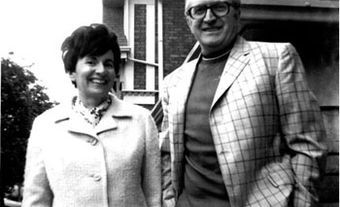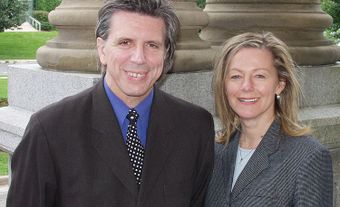Professional Association of Canadian Theatres (PACT)
The Professional Association of Canadian Theatres, headquartered in Toronto, is a membership organization for professional Canadian theatres.
In 1974 Andis Celms, Michael Dobbin, Curtis Barlow, Brian Robinson, Susan Rubes and Judith Hendry created the first jointly negotiated Canadian Theatre Agreement (CTA), between professional Canadian theatres and Canadian Actors Equity Association (CAEA), to address the needs of the growing Canadian theatre industry.
Two years later a group of 33 theatres gathered in Toronto and resolved to "form a solid, national voice in the face of continued erosion by government of subsidies to the arts." The group consisted of theatres from across the country, including the CITADEL THEATRE in Edmonton, the GLOBE THEATRE in Regina, the NATIONAL ARTS CENTRE in Ottawa, the TARRAGON THEATRE in Toronto and the CENTAUR THEATRE in Montreal. The group called itself the League of Canadian Theatres. Gregory Poggi was elected chair.
In 1977 Curtis Barlow was hired as the first executive director, and the organization was incorporated under the name Professional Association of Canadian Theatres (PACT). Barlow's first year was spent negotiating a new 3-year CTA and recruiting members from across the country. PACT took a leading role in the fight against government cutbacks to the arts and in the winter of 1977-78 initiated a postcard campaign that resulted in 50 000 signed postcards being delivered to the first annual general meeting at the National Arts Centre.
In 1978 PACT re-established the International Theatre Institute in Canada (ITI) in co-operation with the francophone theatre community of Quebec. The PACT office became the secretariat of the Canadian ITI and in 1985 Canada hosted the ITI's world congress. PACT established World Theatre Day celebrations in 1979, a tradition that is carried on to this day. Additional voluntary agreements were established with the Associated Designers of Canada and the Playwrights Union of Canada (now Playwrights Guild of Canada).
In 1986 Cathy Smalley was hired as the new executive director. At this time PACT had 83 member companies in 6 regions. The following year Newfoundland was recognized as its own distinct region. PACT continued to address issues such as the devastating effect of AIDS on the arts community, independent contractor status for artists, GST, censorship, changes at the CANADA COUNCIL and new federal Status of the Artist legislation. In 1992 Mallory Gilbert, then general manager of the Tarragon Theatre, was elected PACT's sixth chair, and Pat Bradley began her tenure as the new executive director.
The PACT Communications Centre (PCC) was founded in 1985. PCC's publishing program has included Canada On Stage, Theatre Listing, Human Resources in the Canadian Theatre and many other special reports and studies. PACT and The Canadian Arts Presenting Association/l'Association canadienne des organismes artistiques (CAPACOA) published their report Touring Possibilities in 2001, leading directly to the founding of the national theatre festival Magnetic North in 2003.
The early 1990s were challenging for PACT, as the Canada Council for the Arts made the decision to stop funding arts service organizations and PACT lost significant funding. PACT continued to work with the Canada Council to develop the Flying Squad, a new program it launched in 1998 to respond to the professional development needs of theatre company managers and artistic directors.
Lucy White became the new executive director of PACT in 2001 and continued to develop its 4 program areas: labour relations, advocacy, communications and professional development. An annual conference moves to a different city each year.
In 2004 PACT introduced affiliation as a way to involve and support more small, new and diverse theatres without requiring them to work under its collective agreements; within 3 years it met its goal of recruiting 30 affiliates. In 2005 PACT co-founded the Canadian Arts Coalition, the largest group of artists, arts executives and business leaders ever assembled from across the country who are united in the view that greater public investment in the arts through the Canada Council for the Arts is essential to Canada's future.

 Share on Facebook
Share on Facebook Share on X
Share on X Share by Email
Share by Email Share on Google Classroom
Share on Google Classroom


